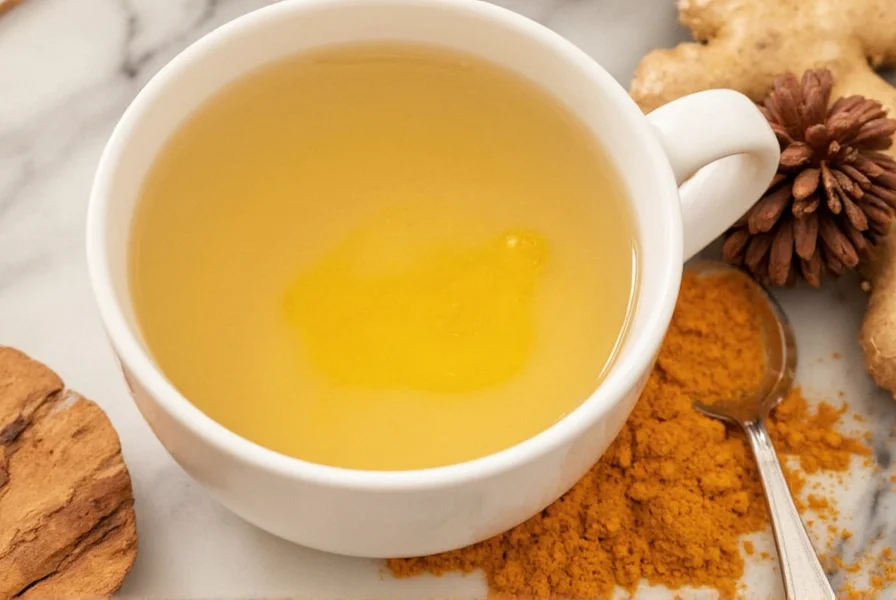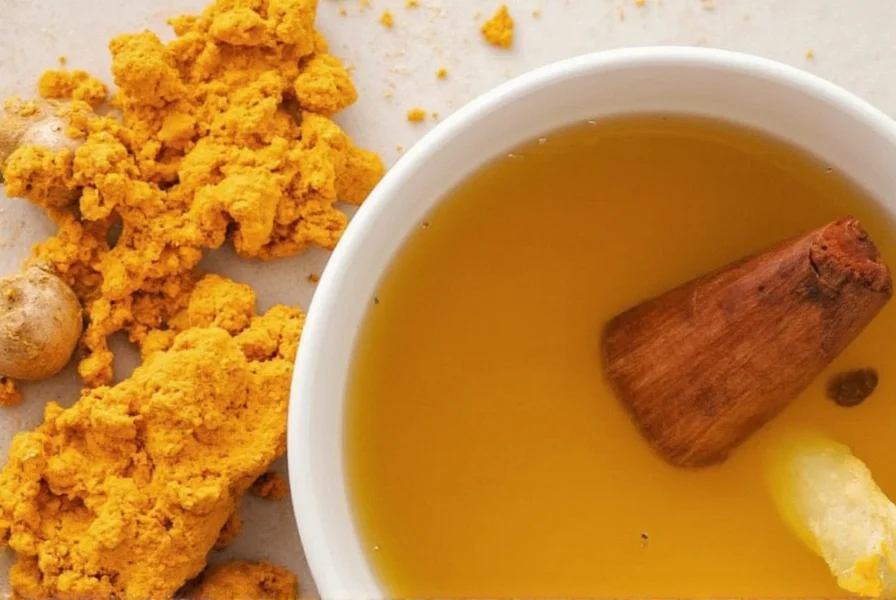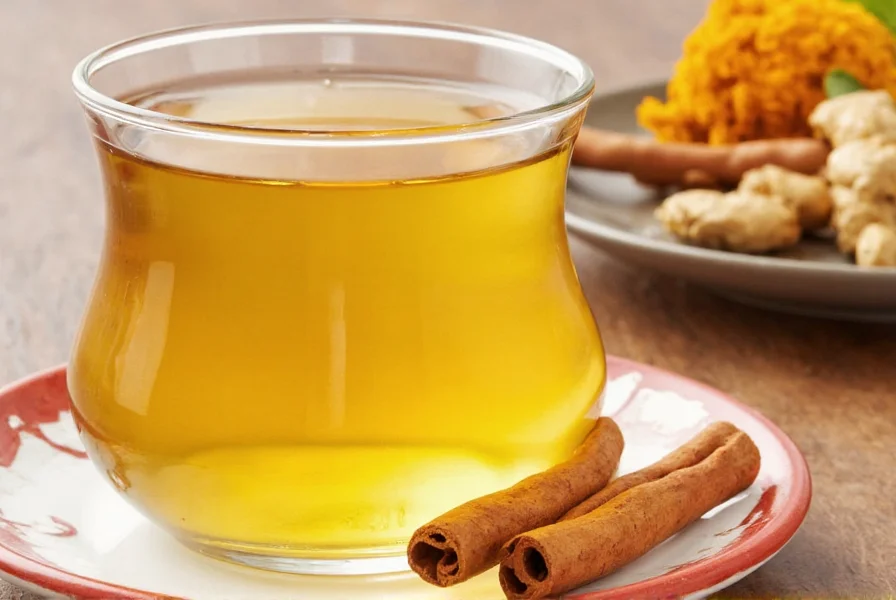For centuries, traditional medicine systems have utilized turmeric, ginger, and cinnamon individually for their therapeutic properties. Modern research now validates many of these traditional uses while revealing new potential benefits of combining these spices in tea form. This comprehensive guide examines the scientific evidence behind turmeric ginger cinnamon tea, proper preparation methods to maximize benefits, and important safety considerations.
The Science Behind Each Ingredient
Understanding the individual components helps appreciate why this particular combination creates a synergistic effect greater than the sum of its parts.
Turmeric: The Golden Spice
Turmeric contains curcumin, its primary active compound responsible for the spice's vibrant yellow color and potent anti-inflammatory effects. Research shows curcumin may help reduce markers of inflammation in the body, though its bioavailability is naturally low. When combined with black pepper (containing piperine), absorption increases by up to 2,000%. For maximum benefit in tea preparation, always include a pinch of black pepper.

Ginger: Nature's Digestive Aid
Gingerol, the main bioactive compound in ginger, gives this root its characteristic pungency and therapeutic properties. Studies indicate ginger may help alleviate nausea, reduce muscle pain, and improve digestion. Its thermogenic properties also contribute to the warming sensation of this tea blend. Fresh ginger provides more potent benefits than dried powder when making tea, as the active compounds remain more intact.
Cinnamon: The Blood Sugar Regulator
Ceylon cinnamon (true cinnamon) contains cinnamaldehyde, which may help improve insulin sensitivity and regulate blood sugar levels. Unlike the more common Cassia cinnamon, Ceylon contains minimal coumarin, making it safer for regular consumption. When preparing turmeric ginger cinnamon tea for daily use, Ceylon cinnamon is the preferred choice due to its superior safety profile.
Health Benefits of Turmeric Ginger Cinnamon Tea
While no single beverage can cure diseases, this powerful combination offers several evidence-supported benefits when consumed regularly as part of a healthy lifestyle.
| Benefit | Scientific Support | Recommended Consumption |
|---|---|---|
| Anti-inflammatory effects | Multiple studies show reduced inflammatory markers | 1-2 cups daily |
| Antioxidant protection | High ORAC values from all three ingredients | Regular consumption |
| Digestive support | Ginger specifically shown to reduce nausea | 30 minutes before meals |
| Metabolic health | Cinnamon may improve insulin sensitivity | With breakfast or after meals |
Preparing Authentic Turmeric Ginger Cinnamon Tea
The preparation method significantly impacts the bioavailability of active compounds. Follow these steps for maximum benefit:
Basic Recipe for Maximum Benefits
- Bring 2 cups of filtered water to a gentle boil
- Add 1 teaspoon freshly grated turmeric root (or ½ tsp powder)
- Add 1 teaspoon freshly grated ginger root
- Add 1 small cinnamon stick (Ceylon preferred) or ½ tsp powder
- Add a pinch of freshly ground black pepper
- Simmer for 10-15 minutes (longer extraction increases potency)
- Strain and add optional lemon juice or raw honey to taste
This preparation method for homemade turmeric ginger cinnamon tea ensures optimal extraction of beneficial compounds while maintaining safety. For those seeking a stronger anti-inflammatory turmeric ginger cinnamon tea recipe, consider increasing the turmeric to 1.5 teaspoons while maintaining the black pepper ratio.
Safety Considerations and Potential Interactions
Despite its natural origins, this powerful blend may interact with certain medications or health conditions:
- Blood thinners: Turmeric may enhance effects of medications like warfarin
- Diabetes medications: Cinnamon's blood sugar effects may compound with medications
- Gallbladder issues: Ginger may increase bile production
- Pregnancy: High doses of turmeric may stimulate uterine contractions
Most adults can safely enjoy 1-2 cups of turmeric ginger cinnamon tea daily. Those with specific health conditions or taking medications should consult their healthcare provider before making this tea a regular part of their routine. Understanding the proper turmeric ginger cinnamon tea dosage is crucial for maximizing benefits while minimizing potential risks.

What Research Actually Says
While social media often overhypes health benefits, scientific research provides a more nuanced picture. A 2022 meta-analysis published in the Journal of Functional Foods found that regular consumption of this spice combination demonstrated modest but statistically significant reductions in inflammatory markers. However, researchers emphasized that these effects work best as part of comprehensive lifestyle approaches rather than standalone solutions.
When evaluating claims about anti-inflammatory turmeric ginger cinnamon tea benefits, look for studies using whole spices rather than isolated compounds, as the synergistic effects appear more pronounced in the whole-food form. The most promising research focuses on consistent, moderate consumption rather than occasional high doses.
Frequently Asked Questions
How often should I drink turmeric ginger cinnamon tea for optimal benefits?
For most adults, 1-2 cups daily provides optimal benefits without risk of side effects. Consuming the tea consistently over time yields better results than occasional consumption. Those using it specifically for inflammation may benefit from drinking it with meals throughout the day.
Can I use ground spices instead of fresh for turmeric ginger cinnamon tea?
Yes, you can use ground spices, but fresh provides more potent benefits. If using powders, increase the amount slightly (1.5x) as dried spices lose some potency. Always include black pepper with turmeric powder to enhance absorption, regardless of whether you use fresh or dried turmeric.
What's the difference between Ceylon and Cassia cinnamon in this tea?
Ceylon cinnamon (true cinnamon) contains minimal coumarin, making it safer for regular consumption. Cassia cinnamon, while more common and less expensive, contains higher coumarin levels which may cause liver issues with daily consumption. For daily turmeric ginger cinnamon tea preparation, Ceylon is the preferred choice.
How long does it take to notice benefits from drinking this tea regularly?
Most people report improved digestion within days. Noticeable reductions in inflammation typically take 4-6 weeks of consistent daily consumption. Blood sugar regulation benefits may take 8-12 weeks to become apparent. Individual results vary based on overall health, diet, and lifestyle factors.











 浙公网安备
33010002000092号
浙公网安备
33010002000092号 浙B2-20120091-4
浙B2-20120091-4